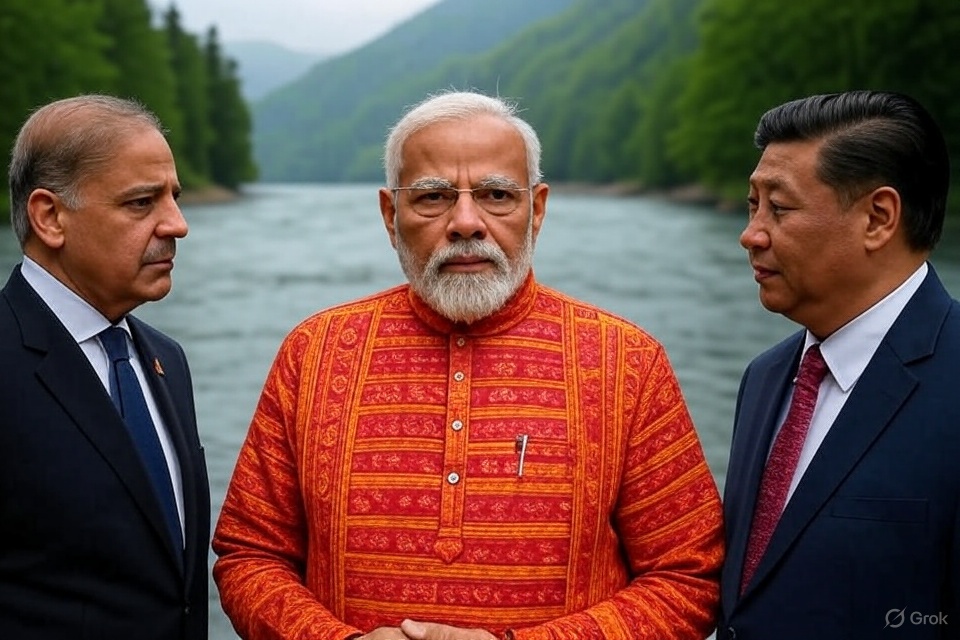Will China Jump into the India-Pakistan Water War? What If Brahmaputra Water Is Blocked?
The suspension of the Indus Waters Treaty (IWT) by India following the Pahalgam terror attack on April 22, 2025, has escalated tensions with Pakistan, prompting Islamabad to seek China’s intervention. Pakistan hopes China will block the Brahmaputra River—northeast India’s lifeline—to pressure India into a two-front water conflict. But will China take such a drastic step, and what would be the consequences for India, Pakistan, and China in this potential three-way water war?
By our correspondent, New Delhi:
Pahalgam Fallout: Indus Treaty Suspension and Pakistan’s Plea to China
India’s decision to suspend the IWT, a 1960 World Bank-brokered agreement, came after the Pahalgam attack, which killed 26 tourists. The treaty had allocated 80% of the Indus Basin’s water to Pakistan, but India’s move aims to pressure Pakistan over its alleged support for terrorism. While the immediate impact on Pakistan’s agriculture and energy is limited due to India’s lack of infrastructure to fully stop water flows, the long-term threat looms large. In response, Pakistan’s Prime Minister Shehbaz Sharif has urged China to block the Brahmaputra River, hoping to force India into a two-front conflict involving both Pakistan and China.
Brahmaputra: Northeast India’s Lifeline
The Brahmaputra River, originating in Tibet as the Yarlung Tsangpo, is critical for northeast India, particularly Assam and Arunachal Pradesh. It supports agriculture, fisheries, and hydropower, with the region’s economy heavily reliant on its flow. China’s planned super dam in Tibet’s Medog region, potentially larger than the Three Gorges Dam, could give Beijing control over the river’s flow. While China claims minimal downstream impact, experts warn that altering the flow could strategically pressure India, especially if used as a retaliatory measure in support of Pakistan.
What If China Blocks the Brahmaputra?
If China restricts the Brahmaputra’s flow, the consequences for India could be significant but not catastrophic:
- Water Crisis in Assam and Arunachal Pradesh: Reduced flow could disrupt farming, fishing, and domestic water supply.
- Flood and Drought Risks: Sudden water releases during monsoons could cause floods, while restricted flow in dry seasons may lead to droughts.
- Hydropower Impact: Projects in the Brahmaputra Basin would face reduced capacity, affecting energy production.
However, India’s overall water security wouldn’t collapse, as rivers like the Ganga, Yamuna, Godavari, and Krishna, which originate within India, provide substantial resources. The Brahmaputra contributes about 30% of India’s freshwater and 44% of its hydropower potential, but India’s diverse river systems mitigate the risk of a nationwide crisis.
China’s Strategic Calculations: A Two-Front War for India?
China blocking the Brahmaputra could escalate tensions, potentially creating a two-front challenge for India—dealing with Pakistan over the Indus and China over the Brahmaputra. However, this scenario is unlikely in the short term. China’s actions would risk international backlash and damage its global image, especially amid its ongoing trade disputes with the U.S. Additionally, the Brahmaputra’s flow through India includes significant contributions from rainfall in high-precipitation areas like Meghalaya, reducing China’s leverage. Posts on X reflect mixed sentiments, with some users warning that China might use water as a weapon, while others argue that India’s hydrological diversity limits the impact.
India’s Countermeasures and Diplomatic Stance
India is preparing to counter any Chinese moves:
- Accelerated Dam Construction: India is fast-tracking water storage projects in Arunachal Pradesh and Assam to secure Brahmaputra resources.
- Data Sharing Agreements: India is pressing China for transparent flood-season data to monitor flow changes.
- Diplomatic Push: India is leveraging international forums to demand transparency in China’s dam projects and respect for downstream rights.
India’s firm stance against Pakistan on terrorism contrasts with its more cautious approach toward China, focusing on border disputes rather than water weaponization. A full-scale “water war” involving all three nations remains improbable, as China’s strategic interests and India’s preparedness reduce the likelihood of drastic actions.


